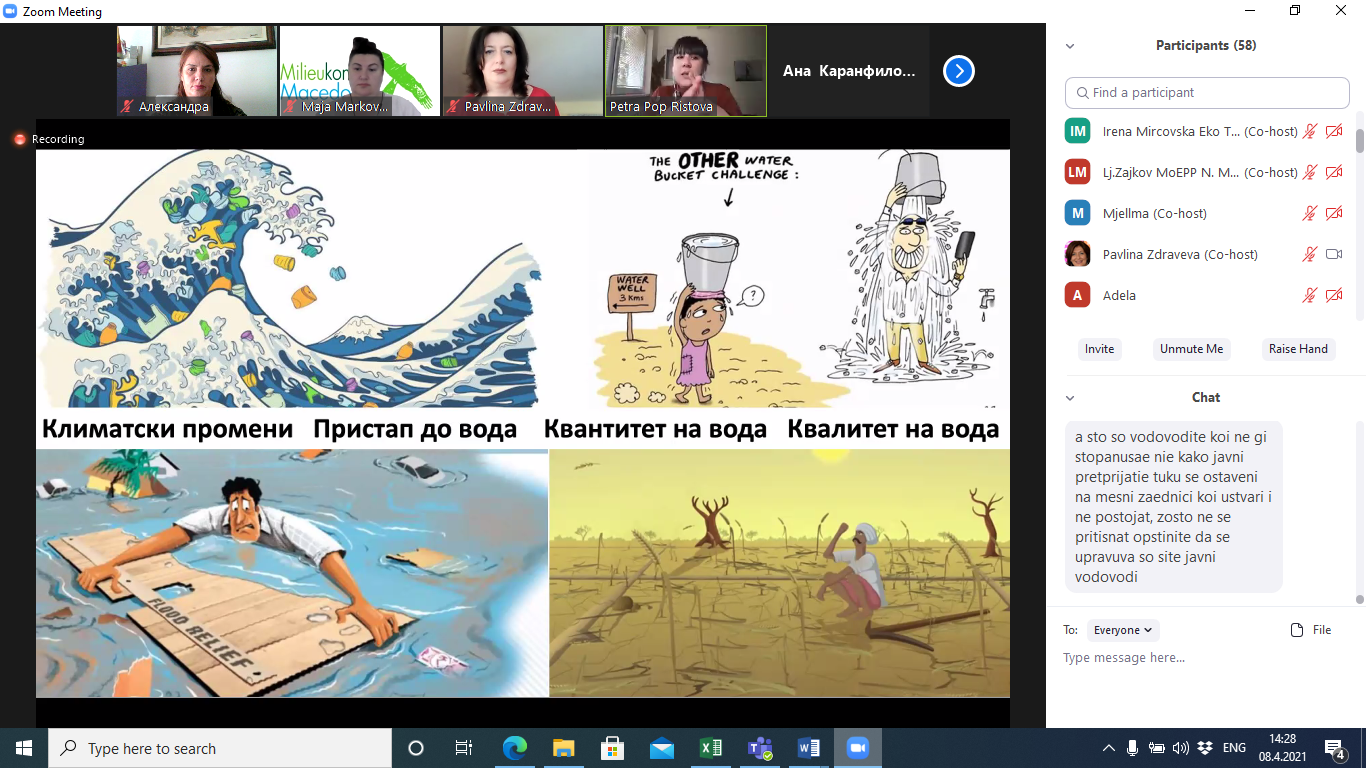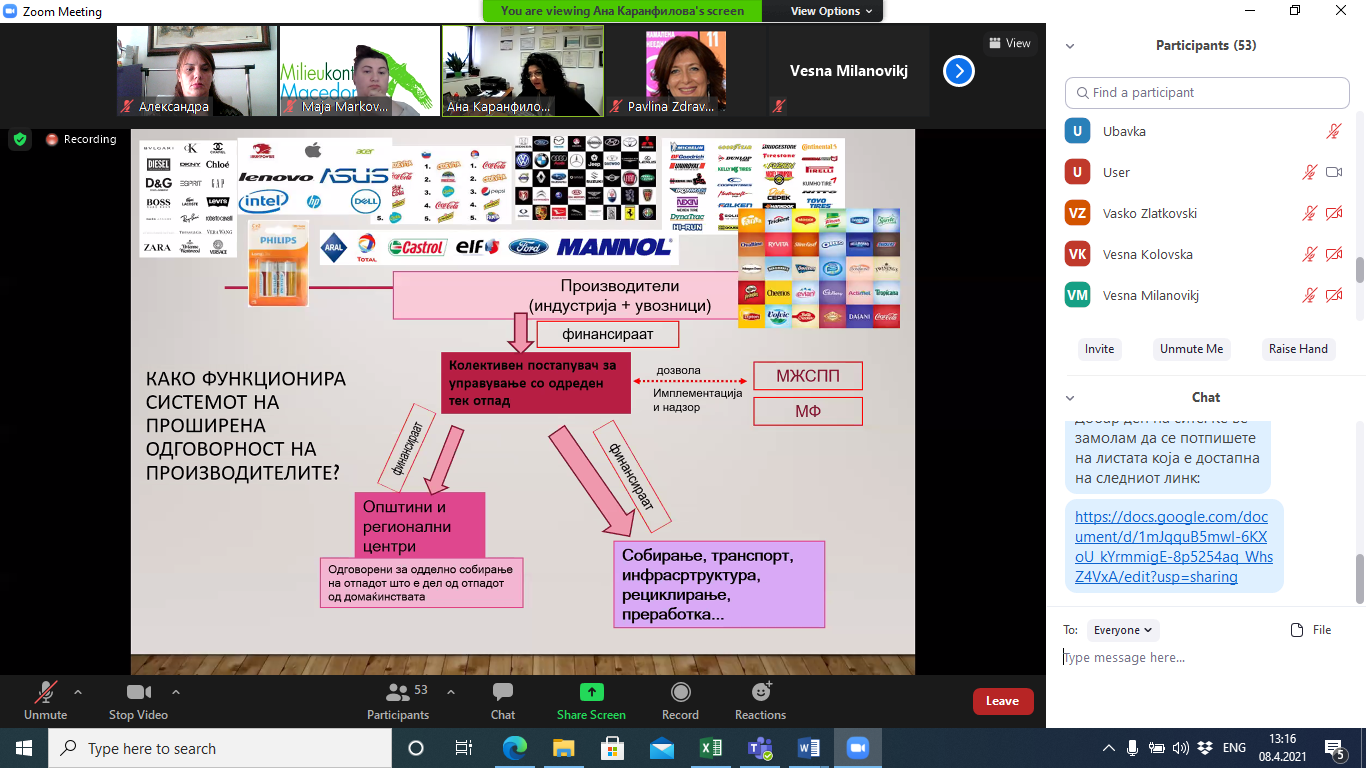Using NEXUSES approaches to fight Climate Change focusing on Water & Waste
On 08.04.2021, ZOR Milieukontakt Macedonia had the third training on "USING NEXUSES APPROACHES TO FIGHT CLIMATE CHANGE FOCUSING ON WATER & WASTE".
On 08.04.2021, ZOR Milieukontakt Macedonia had the third training on "USING NEXUSES APPROACHES TO FIGHT CLIMATE CHANGE FOCUSING ON WATER & WASTE". The training is part of the CBIT project "Strengthening Institutional and Technical Capacities to Improve Climate Change Transparency under the Paris Agreement (CBIT Project)" of the Ministry of Environment and Physical Planning (MoEPP), which is implemented in cooperation with United Nations Development Program (UNDP) and the Global Environment Facility (GEF).
The aim of the workshop was to provide information to relevant stakeholders and the academic community on the links between the water, waste and climate change sectors and the need for necessary action in these sectors and investments in the green low-carbon economy in the post-pandemic period.
The workshop was attended by about 60 representatives of public institutions, representatives of the MoEPP, MLSP, UNDP, GEF, PMF, municipalities in RNM, public utilities and representatives of civil society organizations working in the field of environment.
Ms. Ana Karanfilova Maznevska, Head of Waste Management Sector in the MoEPP, presented the situation with waste management at the national level, starting from the laws and bylaws that are adopted and in force in RNM and their implementation, as well as the planned laws and bylaws to be adopted in the future. She also referred to the situation with waste in the 8 planning regions, where the entire project documentation for the establishment of an integrated and financially sustainable system has been prepared for all planning regions. For the East and Northeast region, the procedure is at the very end, ie the first central waste management plant for the East and Northeast region, which will be located near the town of Sveti Nikole, is expected to be operational in about two years.
Mrs. Ljupka D. Zajkov, Assistant Head of the Water Sector, presented the existing and planned policy and strategic framework of the Water Sector at MoEPP with the engagement of the institutions on this topic and the national progress. She referred to the current and planned water legislation, the basic strategic documents for water management, water use and the vision or goals related to water use in various sectors (agriculture, industry, energy, etc.), monitoring of surface and groundwater conditions and sources of funding for ongoing and planned activities in the watershed.
Dr. Mjelma Mehmeti Petersen, State Advisor for European Integration in the Ministry of Local Self-Government, presented the Western Balkans Investment Framework (WBIF), ie areas where significant investment measures are aimed, who are the beneficiaries of this financial assistance, what are the areas of action, ie financing, etc. The presentation also explained the decision-making system and project selection at the national level, with emphasis on the key conditions that should be met by the proposed projects.
Dr. Petra Pop Ristova in her presentation "Wastewater as a resource", referred to solutions inspired and supported by nature, which are costeffective and at the same time provide benefits to the environment, society and economy, and help build resilience to climate change. . Emphasis was placed on artificial water habitats for wastewater treatment, which are in fact solutions inspired and supported by nature. These water habitats are very cheap to establish and maintain, and at the same time they have great benefits in terms of CO2 mitigation, ecosystem rehabilitation, improving the condition of biodiversity, recreation and aesthetic value. A specific proposed solution for wastewater treatment with willows or zero discharge solution was also explained in the presentation.
Borce Kuzmanovski from the NGO Go Green, Skopje, in his presentation explained the term primary selection and why the primary selection is necessary, ie that the waste will not end up in a landfill and thus will protect the soil, water and air, and also through Active action increases the awareness and habits of citizens to preserve the environment. The "Selektiram" initiative was explained, which is a system for primary selection in households and providing decent working conditions for waste collectors, their protection and education, as well as integration into a formalized waste management system, which was established by Go Green in cooperation with tenants of about 50 buildings in Skopje, where 2405 kg of plastic and paper 4550 kg were collected, from 46 buildings with a total of 1750 tenants who use selection.
Irena Mircovska from the NGO Eco Team East, Kocani, in her presentation presented the goal, activities and results of the project: "Select plastic waste from agriculture and contribute to the fight against climate change." The project was implemented in partnership with EKOPROEKT-KO DOO Kocani, which aims to establish a system for proper handling and management of agricultural waste in the municipality of Cheshinovo - Obleshevo, ie its collection, recycling and handing over for further treatment, compared to the previous throwing of this waste along rivers and through rice fields. The project is accepted as a solution for this type of waste and it is replicated in the municipality of Karbinci.
The entire training is available on this link.
More trainings in the field of climate change are available on the training plan for 2021, while while the past trainings can be viewed here.
-
Корисни линкови
26-01-2021 -
Справување со климатските промени и загадувањето на воздухот во градот Скопје
29-04-2018 -
Финансирање во климата
28-01-2022 -
Микронаративи
08-06-2022
{{"article.lastestPosts"|translate}}
-
Нови финансирања за унапредување на природата и биолошката разновидност на Зелената агенда за Западен Балкан
11-03-2025 -
Започна проектот за развој на 1-от и 2-от двогодишен извештај за транспарентност и 5-от национален извештај за климатски промени на С.Македонија
04-03-2025 -
Земјоделски форум за климатски промени: Се изнаоѓаат решенија за поголема климатска отпроност на заемјоделието
02-12-2024 -
Заврши COP29, центарален фокус на финасирањето за климата
02-12-2024



 Мод за знаковен јазик
Мод за знаковен јазик Говорен асистент
Говорен асистент Означи линкови
Означи линкови

 Зголеми маус
Зголеми маус